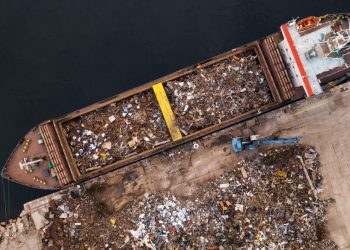Have you ever thought that we all need a reservoir of strength and resilience to have plenty to draw from? That it is important to take care of our own needs and wellbeing first and foremost? Take for instance a shipping organization’s staff; they have to deal with personal or professional challenges and decide effectively in an industry heavily regulated to ensure safety. There is no doubt that professional resilience means a lot for maritime. But, which are the capabilities, skills, and self-care practices that contribute to it?
What is resilience?
Being resilient means remaining a thriving enterprise despite the emerging challenges. Specifically, this ability to bounce back is the ability to bend instead of breaking when under pressure or difficulty. In other words, resilience is a core competency for stress management! The term can be defined also as the ability of being aware of your situation, your risks, weak points and potentials to deal with them and make strategic decisions.
The ability, in the face of difficulty, to retain flexible cognitive, behavioural and emotional responses.
Neenan and Dryden 2002
The ability to mitigate the effects of stress factors such as emotional, cognitive, physiological, behavioural responses to work, the work environment or the organisations.
Levi, 2000 EU Guidance on Work Related Stress
Resilient people:
- are adept at seeing things from another person’s point of view
- tend to have lower levels of depression
- can keep functioning both physically and mentally
- power inner strength that helps them rebound
Why is resilience so important for shipping industry?
As said above, in maritime organisations, people work under the increasing influence of safety management systems. Stress at work may not be a modern-day phenomenon, but it does sometimes feel that the pressures of technology, cooperation. The need for continuous development affects those working in shipping oranisations as well. Therefore, acquiring a clear understanding of resilience may help.
- identify personal triggers
- increase self-awareness and emotional intelligence
- reduce stress and staff turnover
- improve mental and emotional effectiveness
- Increase physical energy through the day
Coping with stress cannot come naturally. The following six steps are of high importance in building professional resilience:
Building professional resilience Step 1: Fight-or-flight
Mistakes always happen; professional resilience is all about recovering a setback. In maritime industry – as in all industries – it is vital to respond to a situation in a timely and safe manner. Search for the positive consequences of a setback.
“Animals react to threats with a general discharge of the sympathetic nervous system, preparing the animal for fighting or fleeing.”
The American physiologist, Walter Bradford Cannon, described first the fight-or-flight response as a reaction that occurs in response to a perceived harmful event, or threat to survival. This reaction is the first stage of the general adaptation syndrome that drives stress responses.
Building professional resilience Step 2: Create strong relationships
Relationships help people share ideas, support each other and create plans to face workplace challenges. Supportive relationships in the workplace are powerful contributors to professional resilience. According to several studies, we have the ability to tolerate a lot more stress when we have supportive relationships with managers and colleagues. In addition, staff needs to feel acceptable and safe, along with the satisfaction that those who care about them are safe and supported in case of emergency.
Building professional resilience Step 3: Look after your health and wellbeing
Talking about relationships, there is another relationship that we need to focus on, more than any other. The relationship with ourselves.
“Your relationship with yourself sets the tone for every other relationship you have.” Robert Holden
Taking care of oneself, is important both for personal and team safety. By taking care of our body we allow it to recharge and recover. Looking after ourselves also means spending time with loved ones, engage in fun activities, recognize our mental and emotional needs and feelings.
Building professional resilience Step 4: Use your strengths
Work is always a routine, people see and interact with same people and they perform the same functions. While in challenging situations, the solution is – not stress of course – but the opportunity to utilize personal strengths and change our feeling of satisfaction about our role.
Building professional resilience Step 5: Ask others
Worrying about taking the wrong decision? Discuss options with others, test your ideas and get consult those who matter. Asking others is a sign of strength rather than weakness; this will actually build respect and trust.
Building professional resilience Step 6: Attend a resilience training program
Employees with high levels of personal and professional resiliency foster confidence, productivity and profit. More and more shipping organisations turn to such training programmes with the aim to provide managers and teams with the necessary skills.
- Help understand how mind works and the difference between pressure and stress
- Provide strategies enabling to improve personal resilience and performance
- Equip people with the resources to design their own plan to get physically and mentally healthier and develop their resilience
- Enhance realistic optimism and can-do attitude
SQE MARINE has also developed a training toolkit in order to provide to shipping Companies an efficient way of training both ashore and on-board personnel to relevant issues.
Ιn conclusion, shipping industry focuses more and more the ways to approach the elements that affect decision making and generic performance. Certainly, there is no question such “Why growing resilience? “; the concept of professional resilience is a focus on staff’s efficient performance rather that staff’s failure; a focus on the ability to start feeling better and bolster your confidence after a setback.
BUILDING RESILIENCE: Read in this series





































































































































